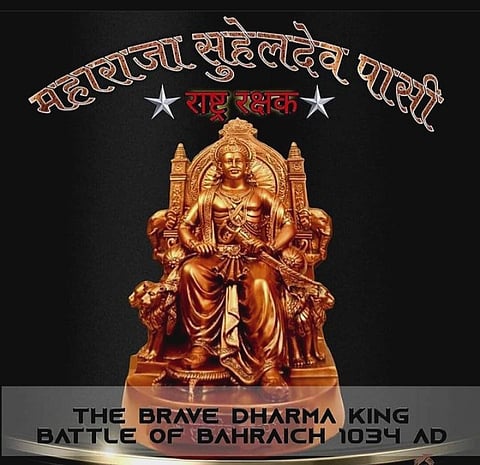
Lucknow: Union Minister Kaushal Kishore on February 14 took to microblogging site X (formerly Twitter) to pay tributes to Maharaja Suheldev Pasi on his birth anniversary.
He referred to the 11th century king as “Suheldev Pasi”. However, the claims of the Pasi community (a Dalit caste in India) over the legendary king from eastern Uttar Pradesh’s Shravasti have not been undisputed, and the Rajbhars and the Rajputs are also vying to declare Suheldev as their ancestor.
Suheldev is a figure shrouded in both legend and historical debates. He is traditionally portrayed as a king who defeated the Ghaznavid general Ghazi Saiyyad Salar Masud in 1034 CE, protecting the region from the “Muslim invasion”.
However, there is no historical evidence to support the claims of his valour and wars.
The primary source for Suheldev’s story is the 17th century Persian hagiography Mirat-i-Masudi. This text paints him as a Hindu king who bravely defended his land against “Muslim invaders”.
Over time, Suheldev emerged as a revered figure for certain communities — particularly the Pasi caste, which sees him as a symbol of their strength and resilience.
However, historians debate the accuracy of the Mirat-i-Masudi and the extent to which it reflects historical reality. Some argue that Suheldev may have been a real king who led resistance against the Ghaznavids, while others believe he is purely a fictional character.
Suheldev’s portrayal has been politicised in recent decades. Hindu nationalist groups have used his story to promote their Right-wing ideology and mobilise support among the Pasi community.
Uttar Pradesh Chief Minister Yogi Adityanath has referred to the king as a “Pasi” and so has Brijbhushan Sharan Singh, a Rajput politician from the state.
It is important to remember that Suheldev’s story is complex and multifaceted. While he may be a legendary figure, the historical evidence to support his existence and his exploits is limited and contested.
It is crucial to approach his story with a critical eye and to be aware of the potential biases and agendas that may be shaping the narrative.
After it came to power in the state, the Bharatiya Janata Party (BJP) has taken concerted steps to popularise Suheldev. In February 2016, the then BJP chief Amit Shah unveiled his statue and launched a book on him in Bahraich district near the Indo-Nepal border where the medieval king was born .
In the same year, a superfast train called ‘Suheldev Superfast Express’ was started by the government.
The train runs between Anand Vihar Terminal of New Delhi to Ghazipur in eastern Uttar Pradesh.
The BJP seems to have used his name to lure both Pasi and Rajbhar communities.
Prime Minister Narendra Modi virtually laid the foundation of Suheldev Memorial in Bahraich on the banks of Chittaura lake. The memorial will have a 40-feet bronze statue of Maharaja Suheldev.
The prime minister remembered him as “the great hero who stood as a shield for Indianness and culture and ethos of the country”. This is the same place where Suheldev is believed to have defeated Salar Ghazi, the supposed nephew of Mohammad Ghazi.
Earlier, on December 29, 2018, PM Modi had launched a postage stamp in Suheldev’s memory. He recalled him as a “brave warrior”, and a “hero” who inspires the people.
He also spoke of his martial and strategic prowess and administrative skills.
While the Rajputs and Rajbhars stake claim to Suheldev’s legacy, the Pasis buttress their claims by citing the Census of 1971, where Suheldev has been identified as an arak — a sub-caste of the community.
Various texts and literature is available, which says Suheldev belonged to the Pasi community.
The Rajbhars also revere Suheldev.
Om Prakash Rajbhar, a prominent leader of the Rajbhar community and a former cabinet minister, has named his party as Suheldev Bhartiya Samaj Party (SBSP) apparently to harness sentiments of the community towards the king.
So, while union minister Kaushal Kishore referred to the king as a Pasi, Rajbhar paid tributes to the king — referring to him as a Rajbhar.
The Rajbhars cite the Bahraich Gazateer of the British to establish their association with Suheldev as it mentions him as “bhar”.
However, an intellectual from the Pasi community says that the “bhars” were the sub-caste of their community, who were employed for Bhar (filling).
While the Pasis, Rajbhars and Rajputs scramble over each other to assert their legacy to Suheldev, the BJP has very deftly shaped him as a Hindutva icon as he is believed to have defeated Syed Salar Masood Ghazi, who is believed to be the nephew of Mohammad Ghazi.
So from naming a superfast train after the king to building his memorial, the BJP has done everything to woo Suheldev’s followers.
While addressing the Bahraich born king as Pasi, BJP leaders like CM Adityanath make sure that the mention of his valour against a Muslim “intruder” is highlighted.
In 2020, celebrated author Amish Tripathi released his eighth book titled ‘The Legend of Suheldev: The King who Saved India’. The book steers clear of associating the protagonist to any caste but makes sure that he is projected as a Hindu warrior against a Muslim invader, who was defeated in the Battle of Bahraich.
The book very blatantly panders to the Hindu sentiment; it has references to the destruction of Somnath Temple and its supposed reconstruction.
Based on the book, eminent director Sanjay Leela Bhansali is making a movie where Ram Charan will be playing the eponymous character.
The story of Suheldev highlights the importance of critically examining historical narratives, particularly those that have been used to promote a particular agenda.
It is crucial to consider the sources of information, the historical context and the potential biases of those who have shaped the narrative.
By doing so, one can gain a more nuanced understanding of the past and avoid perpetuating harmful myths and misconceptions.
Also Read-
You can also join our WhatsApp group to get premium and selected news of The Mooknayak on WhatsApp. Click here to join the WhatsApp group.